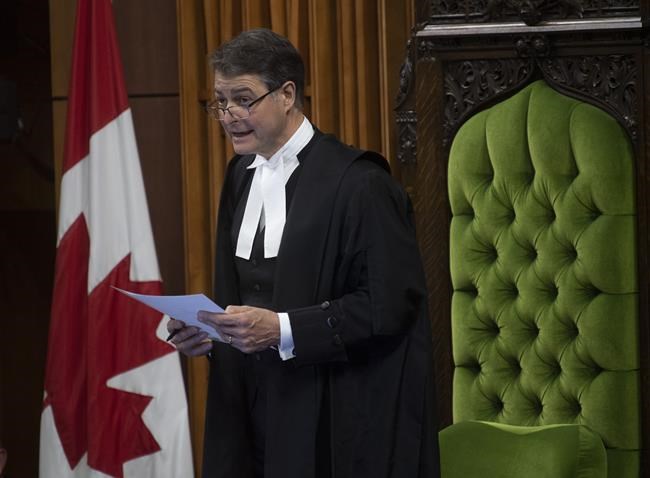Government interfering with ‘exclusive jurisdiction’ of House, Speaker tells court
Advertisement
Read this article for free:
or
Already have an account? Log in here »
To continue reading, please subscribe:
Monthly Digital Subscription
$0 for the first 4 weeks*
- Enjoy unlimited reading on winnipegfreepress.com
- Read the E-Edition, our digital replica newspaper
- Access News Break, our award-winning app
- Play interactive puzzles
*No charge for 4 weeks then price increases to the regular rate of $19.00 plus GST every four weeks. Offer available to new and qualified returning subscribers only. Cancel any time.
Monthly Digital Subscription
$4.75/week*
- Enjoy unlimited reading on winnipegfreepress.com
- Read the E-Edition, our digital replica newspaper
- Access News Break, our award-winning app
- Play interactive puzzles
*Billed as $19 plus GST every four weeks. Cancel any time.
To continue reading, please subscribe:
Add Free Press access to your Brandon Sun subscription for only an additional
$1 for the first 4 weeks*
*Your next subscription payment will increase by $1.00 and you will be charged $16.99 plus GST for four weeks. After four weeks, your payment will increase to $23.99 plus GST every four weeks.
Read unlimited articles for free today:
or
Already have an account? Log in here »
Hey there, time traveller!
This article was published 22/07/2021 (1599 days ago), so information in it may no longer be current.
OTTAWA – A federal attempt to shield documents related to the firing of two scientists is a violation of parliamentary privilege and must be tossed out of court, House of Commons Speaker Anthony Rota says.
In a notice of motion filed Thursday in Federal Court, Rota says the House, by virtue of its parliamentary privileges, has the power to send for the “persons, papers and records” it deems necessary to its functions.
“This constitutionally entrenched power is fundamental to our system of parliamentary democracy, and to Parliament’s critical role in acting as the ‘grand inquest of the nation’ and in holding the executive branch of government to account,” Rota’s notice says.

The executive and the judicial branches do not have the jurisdiction to question, overrule, modify, control or review the exercise of this privilege by the House, the filing adds.
“Under our system of democratic government, the House has unfettered discretion and authority in exercising this power. A contrary determination would be inconsistent with an essential feature of Canadian parliamentary democracy and the separation of powers.
“Only Parliament itself has the authority to abrogate, modify or limit its parliamentary privileges.”
The Liberal government asked the court last month to affirm a prohibition on disclosure of records concerning dismissal of two scientists from Canada’s highest-security laboratory.
The move came shortly after Rota reprimanded Public Health Agency of Canada head Iain Stewart over his repeated refusal to provide the unredacted documents to MPs on the Canada-China relations committee.
Stewart has advised the attorney general in a notice under the Canada Evidence Act that sensitive or potentially injurious information would be revealed should the documents be given to the committee.
After considering the notice, the attorney general filed a court application requesting an order confirming the documents should remain under wraps.
Opposition parties have joined forces to demand the documents in hope that they’ll shed light on why scientists Xiangguo Qiu and her husband, Keding Cheng, were escorted out of Winnipeg’s National Microbiology Laboratory in July 2019 and subsequently fired last January.
They also seek documents related to the transfer, overseen by Qiu, of deadly Ebola and Henipah viruses to China’s Wuhan Institute of Virology in March 2019.
Justice Minister David Lametti, who is also attorney general, said last month the decision to apply to the court was made by Justice officials in accordance with the Canada Evidence Act.
“Those officials are following the law. PHAC is following the law,” Lametti said.
Rota’s notice of motion says Parliament expressed no intention to modify or limit its privileges in adopting the section of the Canada Evidence Act in question.
The attorney general’s application “seeks to engage the court in exceeding its legitimate sphere of activity and to interfere with the exclusive jurisdiction of the House over the exercise of its privileges,” the Speaker argues.
The court lacks the constitutional jurisdiction to do so and the application should therefore be struck out, the notice says.
The attorney general has yet to file a response, and no date has been set to hear Rota’s motion.
This report by The Canadian Press was first published July 22, 2021.


